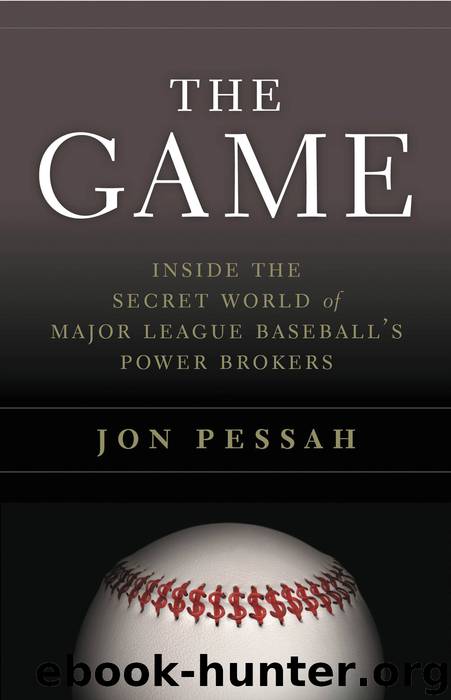The Game: Inside the Secret World of Major League Baseball’s Power Brokers by Jon Pessah

Author:Jon Pessah
Language: eng
Format: epub
Tags: Sports & Recreation / Baseball / General, Sports & Recreation / Baseball / History, Sports & Recreation / History, Sports & Recreation / Coaching / Baseball
Publisher: Little, Brown and Company
Published: 2015-05-04T16:00:00+00:00
Chapter 25
BUD’S BLUFF
November 7–December 23, 2001
THE REACTION TO Selig’s contraction announcement is swift and overwhelmingly negative. Fans are outraged and blister the Commissioner in radio talk shows across the nation. The media excoriates Selig, and many of the leading columnists and television anchors call for his resignation. “I honestly believe that we can get this done by the end of November,” an unperturbed Selig tells baseball’s own MLB.com.
Which is nonsense. But Selig has decided a bargaining chip is a bargaining chip, no matter how much bad publicity it draws.
The union files a grievance that is certain to go to arbitration, rendering Selig’s November timeline moot. A Minnesota judge grants a temporary injunction against any action by MLB in response to the Minneapolis Stadium Board’s claim that the Twins have to honor the one-year contract extension they quietly signed on September 26. The contract gives the Twins the stadium rent free but requires them to play the full season unless they are unable to because of a “strike, an act of God, a natural casualty, or a court order.” Yet another giveaway that Selig’s threat for contraction in 2002 is a bluff.
But that doesn’t mean it can’t happen a year later. And that’s one reason why Florida Attorney General Bob Butterworth subpoenas documents from the Commissioner, the Marlins, and the Devil Rays to learn whether the two Florida teams are on Selig’s hit list. “Why are they always hiding behind closed doors?” Butterworth complains. “They act like they are electing a pope.”
And Congress, sensing headlines, is immediately up in arms. Senator Paul Wellstone (D-MN) and Representative John Conyers (D-MI) reprise their old standby, both introducing legislation to revoke baseball’s antitrust exemption while announcing they’ll call Selig in for hearings. “I am angry,” Wellstone says. “This decision to eliminate these teams is a betrayal by owners who have put their own profits before loyalty to fans.”
Selig is undeterred. The plan to take care of all his ownership issues has been in place for months, voted on and approved at an Executive Council meeting not long after September 11. The owners know—or should know—that contraction for the 2002 season is impossible, but there is significant support for folding two teams in 2003 unless they get big increases in revenue sharing and the luxury tax in the next contract. Baseball will buy the Expos from Jeff Loria for $120 million, run the team for at least the coming season, then either fold or move it to another market, where it’ll be sold for a handsome profit.
Selig silences Loria’s threats to sue with an interest-free loan—and other perks—so he can buy John Henry’s Marlins for $150 million. Henry, the billionaire commodities trader, is negotiating with Disney to buy the Angels. If the Angels deal falls through—Disney chief Michael Eisner keeps changing his mind about selling—Henry will jump into the bidding for the Red Sox. Selig thinks having an owner with small market experience in a major market would help solve the game’s spending problems, and the Commissioner made it clear he’ll do whatever it takes to keep Henry in the game.
Download
This site does not store any files on its server. We only index and link to content provided by other sites. Please contact the content providers to delete copyright contents if any and email us, we'll remove relevant links or contents immediately.
The Brazilian Economy since the Great Financial Crisis of 20072008 by Philip Arestis Carolina Troncoso Baltar & Daniela Magalhães Prates(133684)
International Integration of the Brazilian Economy by Elias C. Grivoyannis(107086)
The Art of Coaching by Elena Aguilar(53156)
Flexible Working by Dale Gemma;(23282)
How to Stop Living Paycheck to Paycheck by Avery Breyer(19684)
The Acquirer's Multiple: How the Billionaire Contrarians of Deep Value Beat the Market by Tobias Carlisle(12303)
Thinking, Fast and Slow by Kahneman Daniel(12214)
The Radium Girls by Kate Moore(12007)
The Art of Thinking Clearly by Rolf Dobelli(10400)
Hit Refresh by Satya Nadella(9111)
The Compound Effect by Darren Hardy(8915)
Tools of Titans by Timothy Ferriss(8356)
Atomic Habits: Tiny Changes, Remarkable Results by James Clear(8312)
Turbulence by E. J. Noyes(8013)
A Court of Wings and Ruin by Sarah J. Maas(7798)
Change Your Questions, Change Your Life by Marilee Adams(7725)
Nudge - Improving Decisions about Health, Wealth, and Happiness by Thaler Sunstein(7684)
How to Be a Bawse: A Guide to Conquering Life by Lilly Singh(7464)
Win Bigly by Scott Adams(7178)
